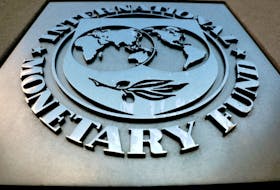By Paul Carrel and Jan Schwartz
BERLIN/HAMBURG (Reuters) - Germany is heading for its longest recession since reunification in 1990 as the coronavirus exposes its vulnerability to disruptions in global trade, business association BDI said on Thursday.
Industry in Europe's largest economy had already contracted for six quarters in a row before the outbreak of the coronavirus early this year, weighed down by global trade conflicts and Brexit uncertainty.
The coronavirus is adding another problem - a scarcity of containers in which businesses can export their goods due to a plunge in the number departing China in late January and early February, which would usually arrive in Germany about now.
"This year, the industrial sector is likely to remain in recession, which will stretch to the longest since reunification," the BDI industry group wrote in a quarterly report.
"With the production slumps in China and the quarantine measures taken by individual countries, it is becoming clear how vulnerable the export-oriented and internationally organised German economy is," the BDI added.
Abudi Zein, chief executive of ClipperData, which tracks shipping flows, told the U.N. Conference on Trade and Development (UNCTAD) container ship visits to Chinese ports dropped sharply in late January and early February, when the virus spread in China.
This has resulted in a reduction in available containers.
"The centrality of China to the movement of goods around the world explains this - if Chinese ports are not loading or discharging containers, there is no reason to stop at the port where the shipment is supposed to go to or come from," Zein said.
In Germany, the Port of Hamburg will not have figures on the impact of the coronavirus on trade and container availability until the end of the first quarter, a spokesman said.
He added, however: "We can imagine that in some areas there are temporary bottlenecks."
CONTAINER CRUNCH
Wolfgang Schaefer, chief financial officer of German car supplier Continental
Under such a scenario, Continental would have a 4-6 week buffer as ships carrying parts would already be on their way.
"But when the last container arrives, the problem starts," said Schaefer, adding that Continental would then try to source parts from other regions and import them by air or road.
Some Continental parts sent from China to Europe and the United States were already being transported via other routes, including by air - a much more costly option.
"Things which are normally transported by ship need to travel by air for a couple of weeks," Continental Chief Executive Elmar Degenhart said in a conference call to discuss full-year earnings.
Hauke Hannig, a spokesman for German ventilator and motor manufacturer ebm-papst, said the family-owned company, which sources components from China, was widening its supply chain routes as bottlenecks had emerged in shipping.
"Containers have become scarce," Hannig said, adding: "Whether by sea, rail or air, transport costs have risen exorbitantly."
The firm, which has three plants in China with some 2,000 employees, has maintained its supply chains so far and is seeing strong demand in China for its ventilators for use in hospitals and medical applications, Hannig said.
Kloepfel Group, supply chain consultants, found in a Feb. 19-March 3 survey of 257 German businesses with China links that the number of managers able to offset shortfalls in supplies via alternative suppliers rose to 35% from 28% in early February.
"Many companies have adapted to the new situation," said Kloepfel Group CEO Marc Kloepfel.
"Since nobody can estimate the effects of the coronavirus for the coming weeks, companies are currently stockpiling their inventories and searching for alternative suppliers worldwide."
Ralph Wiechers, chief economist of the VDMA engineering association, said: "We have to expect disruptions along the supply chain from China to Germany."
(Additional reporting by Tom Kaeckenhoff, Rene Wagner, Edward Taylor, Stephanie Ulmer-Nebehay and Jan Schwartz; Editing by Michelle Martin, Jan Harvey and Philippa Fletcher)








